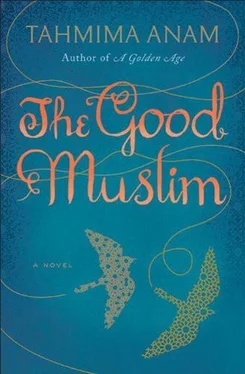Now there was only Chottu and Saima and Kona and the boys from Sohail’s regiment. Saima’s question was circling the room.
Suddenly Sohail stood up, smoothing his kurta and resettling the cap on his head. ‘It’s true,’ he said, his voice the perfect shade of rough-smooth. ‘I have been going to the mosque.’
‘Watch out,’ Chottu said, ‘they steal shoes at the mosque.’
‘And stand at the back, yaar, otherwise the other men will get turned on by your backside. All that squatting and leaning.’ They started to laugh. Chottu got down on the floor, demonstrating the dangers of leaning too far forward in prostration. ‘Trouser can come down any time!’
The room erupted. This was exactly what she had wanted, but she realised, too late, what was happening. There was no way Sohail was going to join in, no way he was going to start laughing at himself.
Kona continued to strum the guitar, humming lightly. Sohail did not sit down. He stared straight into the room and said, ‘It is not a bad thing, to find one’s God.’
‘Alhamdulillah!’ Chottu said, raising his fist into the air.
Kona put down his guitar and spoke up. ‘You remember, Sohail, you told us religion would make us blind — in training you would tell everyone not to recite the Kalma before an operation.’
‘That’s right,’ Sohail said, ‘you remember well. And did you listen to me?’
‘No.’
‘Because you knew I was wrong.’
‘Well,’ he said, smiling, ‘we just didn’t want to get our heads blown off, eh boys?’
Ammoo entered with the cake. It was white and square and decorated with blue flowers. Many Happy Returns, Bhaiya.
‘Dosto,’ Chottu said, ‘we didn’t know it was a birthday party.’
Ammoo lit the candles. ‘Come, beta,’ she said, her hand on Sohail’s cheek, ‘cut the cake.’
They sang. Sohail sliced into the cake and fed a small piece to Ammoo. Usually he would do the same for Maya, but she leaned out of sight, her back against the wall. She saw him putting a piece of cake into his own mouth, and she knew, at that moment, that it would be the last time she would see him this way, pretending to be something of the man she remembered, allowing lipsticked women to dance their fingers on his arm, smelling the whisky on his friends’ breath and watching them all shifting uncomfortably as he talked about the mosque; maybe now he would change his clothes and start to grow a beard, and maybe he would make the trip to Mecca and go into purdah. The future was suddenly clear: he was going somewhere, somewhere remote and out of reach, somewhere that had nothing to do with her, and that even if he didn’t disappear altogether, she would, from now on, be left behind.
Later, when they had dried the plates and scraped the khichuri out of the bottom of the pot, Maya turned to Ammoo. ‘I shouldn’t have done it.’
Ammoo nodded, and without a word continued to divide the leftovers into smaller containers, her elbows working hard, lifting, scooping.
‘Did you see him? The way he looked at everyone, like he was from another world.’
She was waiting for Ammoo to tell her it wasn’t something to get so agitated about, just a phase, it would pass. But, instead, she said, ‘It’s more serious than we thought.’
‘He told you?’
‘He wants to use the roof. To talk.’
‘Talk?’
‘Talk about religion. He’s not a mowlana, he says. We shouldn’t call him that. He says he just wants to go up there and talk about God.’
‘To who?’
‘To anyone who’ll listen. His friend Kona has already signed up.’
Ammoo put her hand up to her hair and retied her bun, twisting firmly from the wrist. Outside, the rain had stopped, leaving the air heavy with its imprint, and with the occasional sound of leaves dropping their last traces of water.
‘There isn’t anything we can do, is there?’
Ammoo bent over to pick up the empty pot and take it to the outside tap. She sounded very tired when she said, ‘No, I don’t think so.’
‘Well,’ Maya said, ‘let’s eat this leftover cake, then.’ And she squatted on a piri beside her mother and passed her a plate with the last corner of the birthday cake, the flourish now gone from the edges, the frosting matted and smudged.
He recited words from the Torah, the Gita, the Bible. He praised the prophets of old, Ram and Odysseus, Jesus and Arjun, the Buddha and Guru Nanak. They were all messengers of God, in their way. Separate in time, diverse in their teaching, yet equal in their desire for human betterment. He spoke to those, like Kona, who had never thought seriously about their faith; he read to them from the Qur’an, and he told them stories about the place where their faith was born, in the high desert of Arabia, where the warring tribes of the Quraysh came together in the shadow of the Ka’bah.
Other religions had their saints, their icons. They had their churches, their gospels, their commandments, their strife, their exiles, their miracles. We, he said, have our Prophet, and our Book. The Book was the miracle. It was so simple. That was the power of the message. It turned them into brothers and guardians of one another. It promised equality. It promised freedom. It was perfect.
The Book spoke to his every sorrow, to every bruise of his life. It spoke to the knife passing across the throat of an innocent man; it spoke to the day his father died, hand on his arrested heart; and it spoke to the machine-gun sound that echoed in his chest, night after night, and to the hollow where Piya had been. And every idea he had ever had about the world, it spoke to those too. That every man was equal before God — how foolish of him to believe that Marx had invented this concept, when it was ancient, even deeper than ancient, embedded in the very germ of every being; that is what God had intended, what God had created. He wept from the beauty of it.
She had forgotten about the trip to New Market when Sohail came through the door a few weeks later. His face was red, the air coming hard out of his mouth. He held a small paper bag in his hands.
‘How is Ammoo?’ he asked, sitting down heavily.
‘She has cancer, how do you think?’ She hadn’t meant to sound so sharp, but he hadn’t been to see Ammoo since that day at the hospital. Ammoo asked after him constantly, and Maya had to tell her he was off somewhere on important jamaat business, that he had sent his love and blessings. There were messages from upstairs, informing them that the Qur’an had been read three times from start to finish in Rehana’s name. Khadija had sent food, sometimes in excessive amounts, which they’d had to throw away because there was no one to eat it.
‘I’ve been praying,’ Sohail said.
‘I know. I heard.’ She remembered his sermon, the way he had admonished her.
He rubbed his face with both hands. Then he held out the paper bag. Inside were the Bata sandals, blue and brand new. She felt a cold flood of panic. Sohail tented his fingers and said, ‘I would like to know how these sandals came to be in my son’s possession.’ Maya noticed a ring on his left thumb, a silver ring with a cheap green stone. She stared at it as she tried to decide how to explain it to him — the market, the salesman, the insult.
‘They were a gift from me. His old sandals were torn.’
‘They were not torn. I have seen them myself.’
‘You’re right, they weren’t torn. But they were too small.’
‘You know I regard humility and truthfulness above all things.’
‘He wanted—’
‘Of course he wanted. He’s a child.’
‘Exactly. He’s a kid — you don’t treat him like one.’
Sohail looked at her directly, sword-like. Damn it, he always knew when she was lying. ‘Did you give him the sandals?’
Читать дальше












